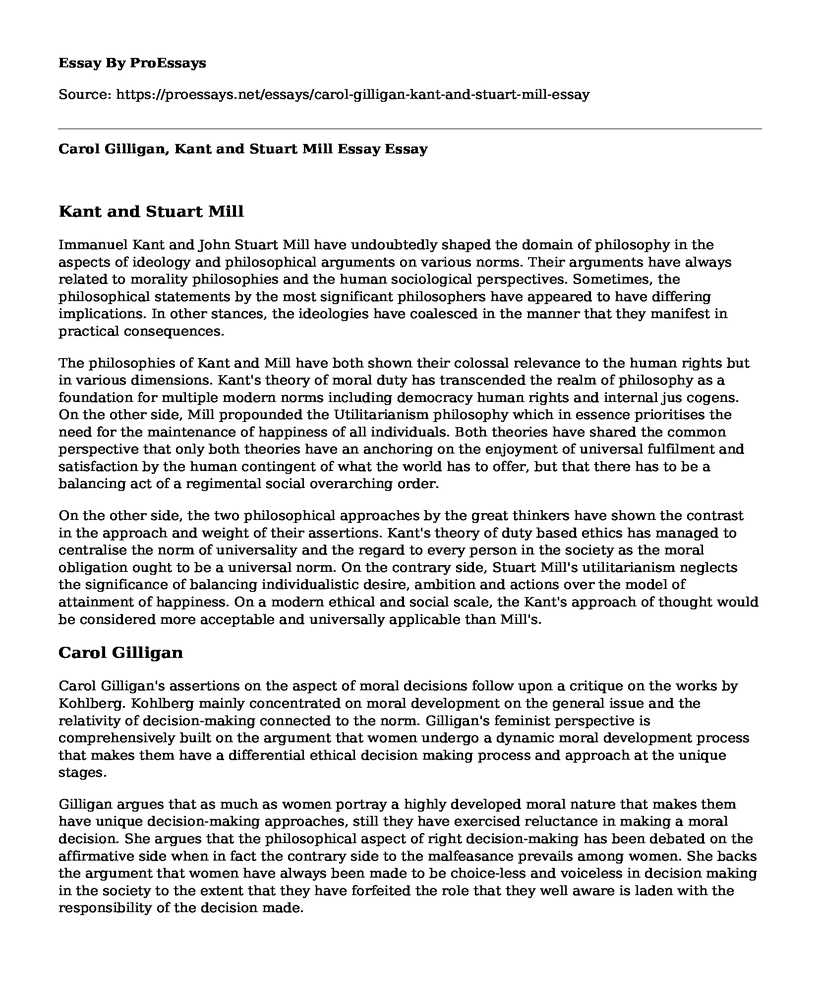Kant and Stuart Mill
Immanuel Kant and John Stuart Mill have undoubtedly shaped the domain of philosophy in the aspects of ideology and philosophical arguments on various norms. Their arguments have always related to morality philosophies and the human sociological perspectives. Sometimes, the philosophical statements by the most significant philosophers have appeared to have differing implications. In other stances, the ideologies have coalesced in the manner that they manifest in practical consequences.
The philosophies of Kant and Mill have both shown their colossal relevance to the human rights but in various dimensions. Kant's theory of moral duty has transcended the realm of philosophy as a foundation for multiple modern norms including democracy human rights and internal jus cogens. On the other side, Mill propounded the Utilitarianism philosophy which in essence prioritises the need for the maintenance of happiness of all individuals. Both theories have shared the common perspective that only both theories have an anchoring on the enjoyment of universal fulfilment and satisfaction by the human contingent of what the world has to offer, but that there has to be a balancing act of a regimental social overarching order.
On the other side, the two philosophical approaches by the great thinkers have shown the contrast in the approach and weight of their assertions. Kant's theory of duty based ethics has managed to centralise the norm of universality and the regard to every person in the society as the moral obligation ought to be a universal norm. On the contrary side, Stuart Mill's utilitarianism neglects the significance of balancing individualistic desire, ambition and actions over the model of attainment of happiness. On a modern ethical and social scale, the Kant's approach of thought would be considered more acceptable and universally applicable than Mill's.
Carol Gilligan
Carol Gilligan's assertions on the aspect of moral decisions follow upon a critique on the works by Kohlberg. Kohlberg mainly concentrated on moral development on the general issue and the relativity of decision-making connected to the norm. Gilligan's feminist perspective is comprehensively built on the argument that women undergo a dynamic moral development process that makes them have a differential ethical decision making process and approach at the unique stages.
Gilligan argues that as much as women portray a highly developed moral nature that makes them have unique decision-making approaches, still they have exercised reluctance in making a moral decision. She argues that the philosophical aspect of right decision-making has been debated on the affirmative side when in fact the contrary side to the malfeasance prevails among women. She backs the argument that women have always been made to be choice-less and voiceless in decision making in the society to the extent that they have forfeited the role that they well aware is laden with the responsibility of the decision made.
Also, Gilligan adds the argument that women have always been inclined to the aspect of care when making moral decisions. She believes that the kind of moral development and role in society has made women more aligned with the tendencies of care, fragility and innocence. She adds that unlike women, the men tend to act in the moral decision in a bid to protect the rights of others. She believes that the research and philosophy by Kohlberg and his proponents focused too much on the moral development rather than the gender-based perspective of moral decision inherent in the varied genders.
Narrative & Unity of Life The philosophical discourse has fundamentally debated on the aspect of human life, morality and ethics with the norms of narrative and the unity of human lifecycle at the centre of it. Narrative has primarily been used to refer to act of recounting and describing the standard of human life. It has become central to argumentative and analytical philosophy because the human life has occupied a vital place in the debate and the bid to seek an understanding of human life and nature. On the other side, the norm of the unity of human life is a product of the discussion of the narrative of life. The term unity of life has been used mainly by philosophers to refer to the far-reaching aspect of human being with a collectivist approach to all the vital norms.
MacIntyre is among the philosophers to have graced the field of human philosophy with a unique perspective of the narrative of human life whereby he posed that human life qualifies to be analysed and described as a narrative. MacIntyre uses this approach to build on his assertion on virtue and the essence of virtue in fulfilling the human life narrative. According to MacIntyre, he desires that people lived life efficiently, an inclination to his argument of virtue as a right approach to living a proper life. MacIntyre's philosophical perspective on the essence of morality underlined his support of the virtue of the unity of life as he believed that in living and even posthumously, there is fulfilment in a virtue-led life that leads to legacy. In many ways, MacIntyre openly discussed narrative and unity of life as part of the human timeline that can only be accomplished through established virtue.
Cite this page
Carol Gilligan, Kant and Stuart Mill Essay. (2022, May 17). Retrieved from https://proessays.net/essays/carol-gilligan-kant-and-stuart-mill-essay
If you are the original author of this essay and no longer wish to have it published on the ProEssays website, please click below to request its removal:
- Is There a Moral Obligation to Obey the Law? Article Review Example
- Comprehend Basic Theories of the Use of Denial and Deception in Shaping Perception
- Ethical Theory: Ethical Egoism Essay Example
- Aristotle Highest Good Essay Example
- Essay Example on Marxism: Exploring Social Development and Human Nature
- The Meaning of Life: Examining Whyte's Argument - Essay Sample
- Normative Ethics: Searching for Moral Standards - Free Essay Sample







